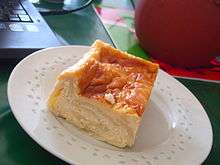Milk-cream strudel
The milk-cream strudel (Viennese: Millirahmstrudel, German: Milchrahmstrudel) is a traditional Viennese strudel. It is a popular pastry in Austria and in many countries in Europe that once belonged to the Austro-Hungarian Empire (1867–1918). The milk-cream strudel is an oven-baked pastry dough stuffed with a filling made from diced, milk-soaked bread rolls, egg yolk, powdered sugar, butter, quark, vanilla, lemon zest, raisins and cream and is served in the pan with hot vanilla sauce.[1]
 Millirahmstrudel (milk-cream strudel) | |
| Type | Strudel |
|---|---|
| Place of origin | Austria |
| Region or state | Vienna |
| Main ingredients | Strudel dough, cream, egg yolks, almonds, sugar, milk, egg whites, raisins |
History
The first documented strudel recipe was a recipe of a milk-cream strudel (Millirahmstrudel) from 1696 in Vienna, a handwritten recipe at the Viennese City Library.[2][3]
A Viennese legend says that Franz Stelzer (1842–1913), who owned a small inn in Breitenfurt near Vienna, was the inventor of the Millirahmstrudel.[4][5] In the story he became a very famous and rich man for that.
Ingredients
Besides the strudel dough the ingredients are: cream, egg yolks, blanched, ground almonds, sugar, 1 roll soaked in milk, 2 whites snow (stiffly beaten egg whites). Sprinkle with raisins and bake lightly. Then pour over sugared milk. Let it evaporate. Then bake in casserole.[6] Serve in the pan with hot vanilla sauce.
References
- AEIOU Encyclopedia
- Apfelstrudel, Milchrahmstrudel, Topfenstrudel auf traditionelle-lebensmittel.at
- Felix Czeike: Historisches Lexikon Wien. Volume 5. Verlag Kremayr & Scheriau, Wien 1997, ISBN 3-218-00547-7, p. 384.
- The myth of the Breitenfurter cream strudel (Sagen aus dem Wienerwald) Archived 2011-10-04 at the Wayback Machine
- Erfinder des Milchrahmstrudels – Franz Stelzer, from: BRENNNESSEL, Das Blatt der Breitenfurter Grünen Archived 2011-08-12 at the Wayback Machine
- Michael Berenbaum, In Memory's Kitchen: A Legacy from the Women of Terezin(2006), ISBN 978-0-7425-4646-2 (p. 59)